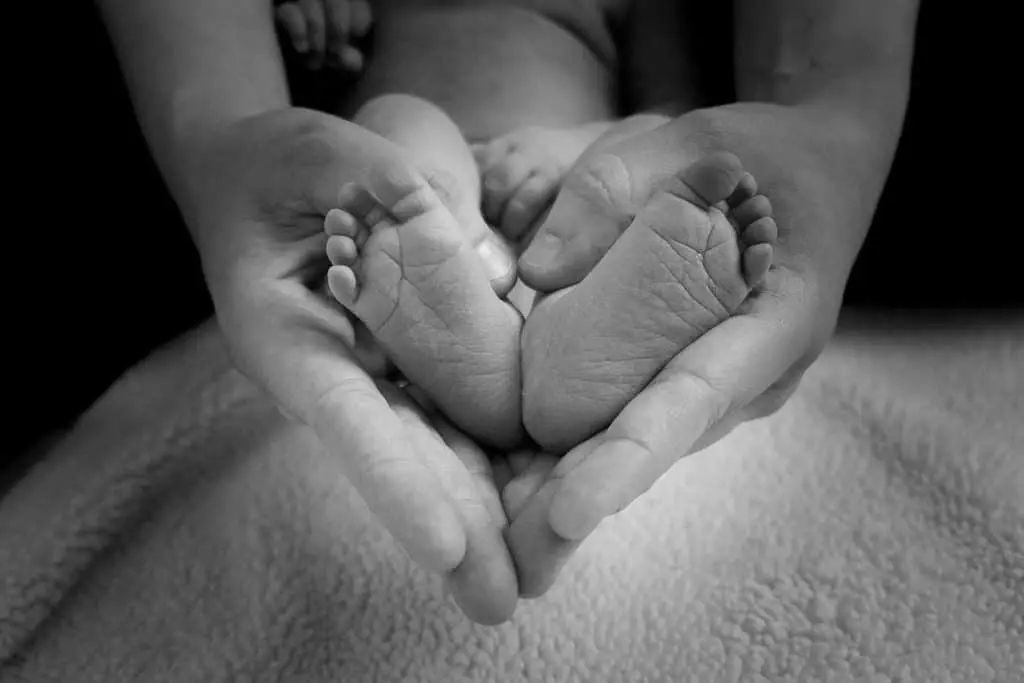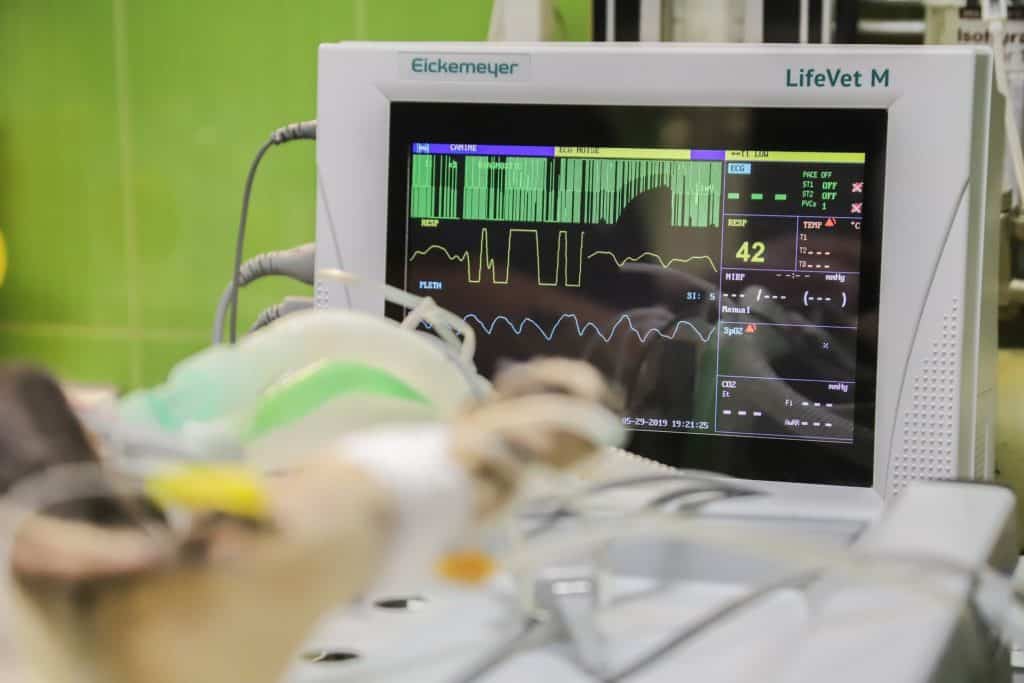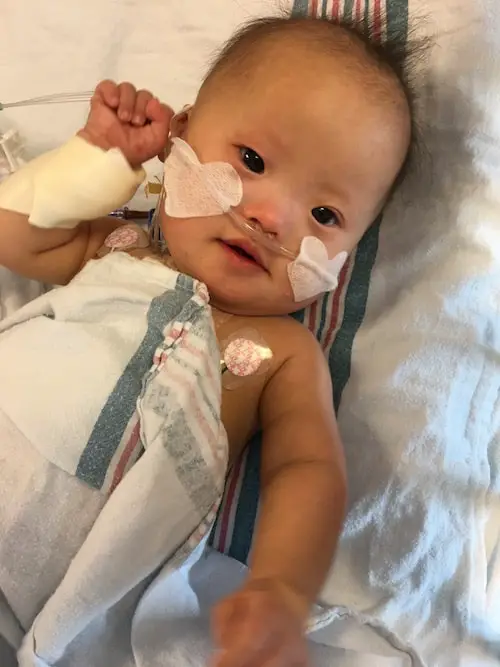Finding out during pregnancy about our baby's congenital heart defect was somewhat overshadowed by her other diagnosis's, like Down syndrome and cystic hygroma. We met cardiologists at the Maternal Fetal Center in Minneapolis as well as cardiologists in Southern California who confirmed that surgery would definitely be necessary.
Our heart warrior had Tetrology of Fallot (TOF), a condition that usually has 4 main characteristics. For us the main issue was a large hole(and a few smaller ones) in her heart called a VSD, or ventricular septal defect. She would require open heart surgery.
Prenatally the most important questions for us were:
- Timing – 3 – 6 months turned out to be an ideal time frame for the surgical repair. When it comes to surgery in general it's important to look at the risk categories. For example, being able to wait until past 3 months to do her surgery would put her in a standard risk category, with generally better outcomes than if we had to do the surgery earlier.
- Size/Weight Gain – Part of the reason waiting longer to do the surgery helps, is that the babies grow to be a little bigger and stronger, making surgical recovery a bit easier. This metric will be a bit different for everyone (so ask your cardiologist!), but the prognosis was better if our baby was over 5.5 lbs, which she was at birth. Keep in mind that different cardiologists may also tell you different information. A friend's cardiologist told them that surgical outcomes were even better for babies heavier than 10 lbs. Our cardiologist never mentioned this, though we did get past this hurdle before surgery.
- Hospital / Surgeon choice – We didn't make the choice until our baby was about 3 months, but having an idea of where and who would do the surgery was certainly an important. Depending on the case, sometimes babies are flown to other hospitals.
- Postpartum Implications – We asked what we would have to watch out for that might result from her condition. Sometimes babies in heart failure can turn blue, meaning they are cyanotic, and you see them in sucking when breathing with ribs. Heart failure is an unfortunate term, because it sounds like the baby is just about to lose heart function. The reality is that heart failure can be more of a chronic condition and persist for weeks or months. The doctor will tell you the signs to watch out for that might require more immediate medical attention. In our case it was sweating during feeds and or missing multiple feeds.
- When to call 911? Trust your instincts and don't hesitate if your baby requires immediate medical attention.
- Medical Interventions Before Heart Repair – What type of medical interventions would be required prior to the heart repair? Would there be multiple surgeries? Any medicines? It's very common for doctors to prescribe a diuretic, which helps to remove fluid from the body. If there's a hole in the heart there might be extra fluid accumulating and the heart has to work extra hard to pump it out. If the heart defect is more complex sometimes shunts are added
Understanding The Medical Situation
Find a cardiologist who you can trust. When it comes to your baby's individualized heart condition, you really need to rely first and foremost on the cardiologist to inform you and make medical decisions.
Best ways to find a cardiologist :
- Check your insurance network – Heart appointments are not cheap. Find an in network doctor on your insurance plan.
- Confirm cardiologist affiliation – Perhaps find a cardiologist affiliated with the hospital you plan to have the repair done. This helps with sharing of medical records so that you don't have to spend time worrying about that bureaucratic hangup. Because we chose a hospital outside of our city, we arrived on the day of pre-op only to find that our surgeon did not have the latest records from the cardiologist.
- Word of Mouth – If you've been connected with local support groups you can ask for recommendations
- Reviews – It's often tough to find a large sample of reviews, so take these with a grain of salt. However you can sometimes find Google or Yelp reviews on doctors.
Finding Support
Your cardiologist office should have a list of heart support groups. Facebook has also become a great resource for niche communities. I joined a few heart mom groups but there are groups broken down by diagnosis and location.
Quite a few moms offered to send me pictures of their babies post surgery so that I would be prepared. The first time you see any baby with a large incision on the chest, it may be shocking. Facebook support groups may also be a source for these pictures.
Comparing Hospitals
The STS database is “the largest database in North America dealing with congenital cardiac malformations. The CHSD contains more than 475,000 congenital heart surgery procedure records and currently has more than 1,000 participating physicians, including surgeons and anesthesiologists.”
The database compiles statistics on outcomes and mortality rates. We were deciding between the children's hospital in Orange County (CHOC) or Los Angeles (CHLA). Both provide a high level of care and would have been great choices. In the end we went with CHLA because they have a higher volume of surgeries. That did have its downsides though, because our surgery got bumped twice.
Refer to the US World And News Report rankings for further ratings on surgical outcomes and complications.
What To Bring To The Hospital
Basic Packing List
- Baby's change of clothes for the day home. If you are staying near the hospital the day before pre-op you may also need a second set plus perhaps a spare set of clean clothes to put on your baby. Some recommend side snapping onesies or gowns so that wires can poke out of the baby. This is not entirely necessary – typical onesies are fine and my baby spent alot of the hospital stay just naked or covered with blankets.
- Baby blanket – After changing into the hospital gown on operation day, there's still a fair bit of waiting, and you can use a hospital blanket or bring your own. There was a period of waiting where we didn't have access to a hospital blanket though, so it was helpful that we had one.
- Pacifier/soother or favorite toy – Your baby will be pricked during the blood draw. It's not uncommon for a baby to have rolling veins (like mine), and one of the phlebotomists (the person who does the blood draw) had to make 3 pokes to finally draw blood. No kid enjoys the blood draw. After surgery your baby will probably have a few more experiences that aren't particularly pleasant.
We didn't try this ourselves but you can actually buy a microwavable plush animal that has a soothing lavender scent.
- Baby Bath Tub – If you are staying elsewhere the night before surgery, you should bring a baby bath tub. You will have to wash the baby with a soap given by the hospital.
- Pumping Items – If you are an exclusively pumping mama like I am, you will need all your pumping gear and parts, like a pump bra, portable pump, bottles. The hospital may be able to provide a pump, but I found it easier to use my own during pre-op, because we were moving around the hospital.
- I also had the issue of not being able to sanitize my pump parts in between sessions while waiting at the hospital. So I bought the following spray. I rinsed the parts with water and then sprayed. Let stand for 10 minutes and then you're good to go.
What It's Like
Pre-Op
Pre-op is the day before the operation, where they draw blood to run a battery of tests, swab the child's nose to assess illness, and take a chest x-ray. You will meet with a nurse practitioner to talk about the baby's history and also get any questions answered.
For us there was alot of waiting. Bring something to do. And to entertain the baby.
The surgery schedule was not determined until the day before. And in our case, we actually spent the whole day at Children's Hospital of Los Angeles (CHLA) for pre-op, because the blood draws took awhile and there were long waits in between. It was 5pm before we checked into the nearby Ronald McDonald House for the night.
At 5:30pm the nurse called and said our surgery was canceled the next day, and we would have to reschedule. As a massive hospital that gets a higher volume of babies and emergency cases, this is always a possibility. My husband was pissed because he had not realized this could happen. Prepare for the possibility ahead of time.
Typically on pre-op you will get a call telling you the last time your baby can eat before surgery. Before bed you will give the baby a bath with the soap that the hospital gives you. The written instructions said to scrub the baby for 5 minutes. I did not read this beforehand and definitely did not do this. (Mom Guilt talking here, but it all turned out ok)
If you have an early surgery time then it's best to try to get the baby to bed earlier. Quite honestly, you will probably get little sleep.
I was a ball of nervousness, excitement, and anxiety all night. The day was finally coming. The outcome was also going to be out of my hands – I had done all my research to get us there, to the best hospital possible for our family, in the hands of the best surgeon I could find.
Surgery Day
Breastmilk can be fed typically up to 4 hours before surgery, while for formula the last feed is more like 6 hours before surgery. Pedialyte can be given up until 2 hours before the appointed time. The nurse can give you pedialyte so that you don't have to bring your own. They also have ready serve bottles, though you should either ask for bottle nipples to use or bring your own.
We got to the hospital early and were ushered into a room to see the nurse practitioner. Then we were asked to do an antibacterial wipe of my warrior, which gave me a little anxiety because, uh, shouldn't the nurse do it so that I don't do it wrong? They assured me it was fine and that of course the baby would be scrubbed pre-surgery to minimize infection risk.
Then we put her in a hospital gown, and waited. The last step was meeting the anesthesiologist, who actually helped answer some general questions about the day too.
We placed her on the hospital bed, and wheeled her to the door of the operating room. My husband asked if we would be allowed into the OR and I laughed. That would probably be a good way to kickstart a panic attack for parents.
Thankfully at 5 months my warrior was not really aware of what was going on. We gave our hugs and kisses, and my husband nervously told the anesthesiologist our baby was probably going to have separation anxiety from us. Thankfully that did not happen with our happy baby. I do remember her head rotating to catch another glimpse of us before going into the operating room.
We were told to go get something to eat and that the surgery should be done by about 3 hours. There's a family waiting room where we would be called by the surgeon and updated. Then it would take another hour or so to get her situated in the CTICU (cardiothoracic surgery intensive care unit), before we could go see her.
At 4 hours we were getting a bit nervous. Then I got a call from the CTICU..she had gone directly there without warning and she was ready for us!






Pingback: The Most Common Types of Birth Injuries – Full Time Baby
Pingback: Maybe Having A Special Needs Child Is My Special Need Right Now – Full Time Baby
Pingback: It Took Me 9 Months To Teach My Down Syndrome Baby To Breastfeed. This Is How We Did It - Full Time Baby